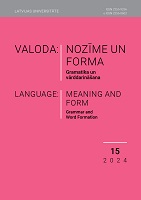Ieskats vārddarināšanas jautājumos Jāņa Endzelīna darbos
An insight of word-formation issues in the works of Jānis Endzelīns
Author(s): Anna FrīdenbergaSubject(s): Morphology, Historical Linguistics, Baltic Languages, Philology
Published by: Latvijas Universitātes Akadēmiskais apgāds
Keywords: Jānis Endzelīns; word-formation; language practice recommendations; differentiation of formatives; language history;
Summary/Abstract: The article is devoted to the contribution of Jānis Endzelīns in the field of Latvian wordformation. Endzelīns in his works has turned to the word-formation issues in several aspects. In historical aspect Latvian word-formation system has been viewed in scientific works of Endzelīns, whereas practical recommendations in word-formation and language culture issues are touched upon in the meetings of Riga Latvian Society’s Linguistic Department meetings, discussing the formation of many new terms in the 1930s. Endzelīns has paid special attention to several word-formation issues discussed in the article. For example, he has explained the use of some word-formation affixes in the formation of new words, taking into consideration different semantics of the formatives: substantives with suffix -īb- and -um-, adjectives with -īg- and -isk-, -ēj- and -īg- etc. In the meetings of Linguistic Department, the incorrect use of affixes is often discussed. Some types of compound formation Endzelīns considers as not corresponding to Latvian and recommends instead different formatives with suffix -kl-. Giving recommendations about the formation of new words, terms, Endzelīns draws upon several principles. Two main principles of Endzelīns in formation of new words is the tradition of Latvian language, its laws, as well as oldness of forms and constructions, comparison with Lithuanian. Speaking of tradition, Endzelīns often mentions the principle of analogy, very significant in word-formation, emphasizes that it is important to take into consideration word-formation stem from which corresponding derivatives are made, and the meaning of suffixes. The principle of language economy is also significant. New terms must be formed on the basis of patterns existing in the language; one must have knowledge of the semantics of the affix, and neologisms must fit in the Latvian word-formation system. Very essential for Endzelīns were the ties between Baltic languages, examples of common lexis.
Journal: Valoda: nozīme un forma
- Issue Year: 2024
- Issue No: 15
- Page Range: 75-94
- Page Count: 20
- Language: Latvian

